View Larger Image

The 10 TEDxUAMS presenters and some of team that put on the event celebrate on stage at the end of the day.
Image by Bryan Clifton
First UAMS TEDx Talks Generate Excitement, Appreciation
| TED talks focus on “ideas worth spreading.”
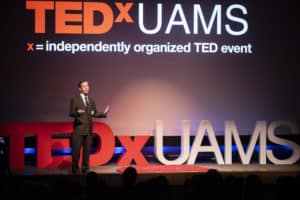
Chancellor Cam Patterson, M.D., MBA, welcomes attendees to the first TEDxUAMS.Bryan Clifton
That philosophy was on display Feb. 7 as UAMS held its first ever TEDx talks in its Jackson T. Stephens Spine & Neurosciences Institute.
Nearly 200 people in the audience and another 100 people at simulcast locations eagerly awaited the 10 Team UAMS members who took the stage to tackle a wide variety of issues including physician burnout, mental health, abuse, the power of social media in medicine and more.
“TEDxUAMS was an amazing success, and one I hope we can replicate soon,” said Chancellor Cam Patterson, M.D., MBA. “Months of hard work went into putting on an event of this magnitude, and I want to applaud Organizational Development’s Lisa Wymer and Shelby Fray for spearheading a multi-departmental effort that included Classroom Technology, Communications & Marketing and Campus Operations.”
Wymer said she wanted to bring TEDx to UAMS “because events like these bring people together and spark collaboration and innovation.”
The 10 speakers were selected during an audition process in October. Since then, Wymer and Fray have been working with each speaker to refine their presentation.

College of Medicine faculty members Jerad Gardner, M.D.; Erick Messias, M.D., Ph.D., M.P.H.; Jennifer Hunt, M.D.; and Paulette Mehta, M.D., grab a letter for a quick photo following their presentations.Bryan Clifton
“The topics presented by our speakers were purposely varied in subject but also deliberately personal,” said Wymer. “I hope TEDxUAMS felt like a celebration of our team — the innovators, the survivors, the ‘outside of the box’ thinkers — basically a celebration of everything that makes UAMS great.”
Kicking off the presentations was Paulette Mehta, M.D., MPH, professor of hematology and oncology, as she shared how she uses poetry to stay emotionally healthy when treating cancer patients.
She noted that just as patients experience psychological distress on their cancer journey, so do their physicians. Expressive writing helps relieve some of that distress, she said before sharing excerpts from her poetry.
Tiffany Haynes, Ph.D., an assistant professor in the Fay W. Boozman College of Public Health’s Behavior and Health Education Department, tackled the issue of mental health in the United States. She wanted to make sure the audience knew that “It’s OK to Not Be OK,” so she wore the motto emblazoned across her white T-shirt.
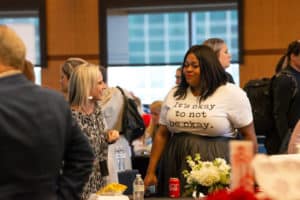
Presenter Tiffany Haynes, Ph.D., (right) talks to a TEDx talk attendee during a break.Sam Giannavola
“Too often we look at mental health through a window instead of a mirror. We see other people’s problems but not our own,” she said. “We need mental health to become about us for a change to happen.”
Wendy Ward, Ph.D., director of interprofessional faculty development in the UAMS Office of Interprofessional Education, took the stage as a patient instead of a health care expert.
Her recent shoulder surgery reinforced her belief that team-based health care provides the best health care, she said, noting that even though she had an amazing surgical and occupational therapy team, there was something missing. Other professionals, including a clinical pharmacist to help manage her pain and a psychologist to help with her fears of never being normal again, were needed on her team for her to really have the best care possible.
She encouraged other patients to advocate for a team-based approach with their care.
“We need team-based health care because we are whole people,” she said. “The future of health care is team-based care, and we deserve the future now.”
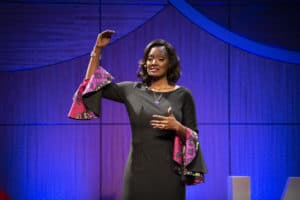
Amber Booth-McCoy encouraged audience members to practice intentional inclusivity.Bryan Clifton
Closing out the morning session was Amber Booth-McCoy, senior diversity specialist in the Division of Diversity, Equity and Inclusion. Booth-McCoy welcomed the crowd to her funeral and read her obituary as she explained how she was killed by kindness and colorblindness.
“I am not just an African American woman, but being an African American woman shapes how I move through the world,” she said. “When someone tells me ’they don’t see color,’ they are devaluing my life experiences.”
She shared a story about a 7-year-old African American boy in one of UAMS’ summer camps who has already internalized fear. During preparations to celebrate the end of the camp with water balloons and water guns at a local splash pad, he asked her if she had told the police they were going to have water guns at the park.
She discussed her fear that childish pranks could result in injury or death for her 14-year-old son and his friends. She stressed that this constant fear is a very real part of her life.
“Kind and colorblind is killing millions around the world. The cure is intentional inclusivity,” she said.

Audience members found themselves laughing and crying during the day’s presentations.Bryan Clifton
After a break for lunch, Jennifer Hunt, M.D., M.Ed., chair of the Department of Pathology in the College of Medicine and the Aubrey J. Hough Endowed Professor of Pathology, tackled imposter syndrome, or self underappreciation syndrome, which affects 70% of women and 50% of men.
She confessed she has an internal mean girl, named Alice, who belittles her and tries to make her feel she isn’t worthy.
“Alice is holding women back and contributing to the gender leadership gap,” Hunt asserted.
Hunt challenged the audience to ask themselves three important questions: 1) Who is your Alice? 2) What is she keeping you from doing? and 3) What would you accomplish if you stuffed her in the trunk?
Kimberly Jones, who works with UAMS Northwest Community Health & Research, shared with the crowd the story of her childhood abuse. She warned the audience that so often we focus on the so-called “signs of abuse” that we miss other types of abuse that don’t come with bruises.
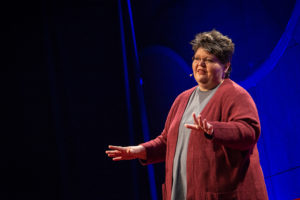
Kimberly Jones bravely shared her story of being abused as a child and how that abuse affects her today.Bryan Clifton
Over two years when she was a young teenager, her mother and grandfather died, her father was emotionally abusive and she was raped twice. Through all that, no one ever noticed.
“I didn’t look abused, so no one ever reached out,” she said, adding that she was so ashamed of what was happening she certainly didn’t reach out to anyone for help.
Jones was one of several speakers to receive a standing ovation for her presentation.
Erick Messias, M.D., Ph.D., M.P.H., the College of Medicine’s associate dean for Faculty Affairs, tackled physician burnout in his presentation. He recounted the death of a friend and colleague on Oct. 7, 2013, to suicide — a death in which burnout played a role.
For Messias, who is also a professor of psychiatry, meaningful work is a solution to burnout. Finding meaning in one’s work brings with it a sense of belonging and a sense of purpose, he said. It often requires reframing our internal storytelling from one that is negative (I have PTSD) to one that is redemptive (I am growing from the traumas in my life). Ultimately, finding meaning in one’s work brings with it transcendence, or a sense that you are connected to something bigger than you, he said.
Kevin Ryan, J.D., an associate professor for Health Policy and Management and associate dean for Student and Alumni Affairs in the Fay W. Boozman College of Public Health, pushed the audience a bit out of their comfort zones, challenging them to admit that “Anti-Vaxxers Love Their Children Too.”

Joe Thompson, M.D., had advice for audience members on how to life well and die fast.Bryan Clifton
While stressing that he is firm believer in the benefit of vaccines to prevent disease, Ryan said the villainization of those who don’t vaccinate their children hasn’t been helpful.
“Anti-vaxxers are trying to protect the health and well-being of their children the best way they know how,” he said. “Instead of demonizing them, we need to learn how to talk to each other so that we can educate them on the benefits of vaccination.”
Joe Thompson, M.D., M.P.H., president and CEO of the Arkansas Center for Health Improvement, urged listeners to make good investments in their personal health by exercising and eating healthy foods.
“We all want to live well and die fast,” he said. “These days we are living longer, but our last decades aren’t necessarily healthy ones.”
As people age, he encouraged them to ask the important “what if” questions. He touted three steps for planning for one’s later years: 1) Create a single-page medical history that lists all of your diagnoses and medications; 2) talk about the end of life you want and create an advanced directive that reflects your wishes; and 3) make copies of that document to keep in easily accessible places and give to your friends and family.
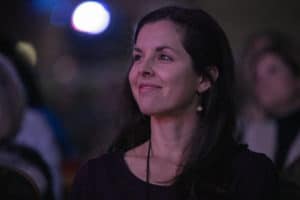
Claudia Carberry said she really appreciated the health care focus of the day’s presentations.Bryan Clifton
The final presenter was Jerad Gardner, M.D., an associate professor of pathology and dermatology who has a sizable social media following. His talk “Facebook and Rare Cancer Changed My Life,” discussed how joining a rare cancer support group on Facebook changed the course of his career.
“The first time I answered a question in the group, they embraced me,” he said. “They said I was the first doctor to join the group and try to educate them.
“Knowing how much it means to those patients to better understand their disease put a fire in my soul to do more. I may be exhausted and tired, but I’m not burned out. I know my job has meaning.”
He encouraged other physicians to use social media to reach their patients and predicted that Facebook groups are going to change how rare diseases are treated.
Throughout the day, videos of earlier TED talks from around the world were shown, often expanding on themes being discussed by the UAMS speakers.
Audience members said they were wowed by the day’s presentations.
“My favorite part of the day was finding out that all of these ideas are right here at UAMS,” said Mande Corbett, coordinator for Stocked & Reddie, the UAMS food pantry. “Dr. Messias’ burnout talk really resonated with me. I find meaning in what I do, but my intensity level can get off balance. It was a good reminder for me to check myself.”
Claudia Carberry, a registered dietitian and member of the kidney transplant team, said she really appreciated the health care focus of so many of the presentations.
“Collectively, the speakers gave us ideas on how to prevent burnout, and do our jobs in a caring and compassionate way.”
The presentations are being edited, Wymer said. Once that process is completed, they will be uploaded to the TEDx YouTube channel to be curated by TEDx.